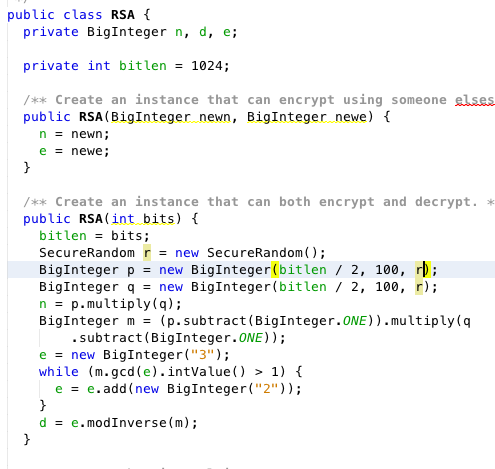 |
|
หากผมต้องการให้มัน p กับ q มีค่าคงที่ต้องทำยังไงเหรอครับ ขอแนวทางครับ เพราะผมได้ลองใส่ตัวเลขลงไปตรงๆมันก็ใส่ได้ เข้ารหัสได้ แต่ถอดไม่ได้ หาก p q ไม่คงที่ เวลาเข้ารหัสใหม่ด้วยข้อความเดิม ค่ามันเปลี่ยนนะครับ เรยทำให้ login ไม่ผ่าน เมื่อมันไม่ตรงกับฐานข้อมูลนะครับ

Code (Java)
package gui;
/*
* To change this license header, choose License Headers in Project Properties.
* To change this template file, choose Tools | Templates
* and open the template in the editor.
*/
import java.math.BigInteger;
import java.security.SecureRandom;
/**
* Simple RSA public key encryption algorithm implementation.
* <P>
* Taken from "Paj's" website:
* <TT>http://pajhome.org.uk/crypt/rsa/implementation.html</TT>
* <P>
* Adapted by David Brodrick
*/
public class RSA {
private BigInteger n, d, e;
private int bitlen = 1024;
/** Create an instance that can encrypt using someone elses public key. */
public RSA(BigInteger newn, BigInteger newe) {
n = newn;
e = newe;
}
/** Create an instance that can both encrypt and decrypt. */
public RSA(int bits) {
bitlen = bits;
SecureRandom r = new SecureRandom();
BigInteger p = new BigInteger(bitlen / 2, 100, r);
BigInteger q = new BigInteger(bitlen / 2, 100, r);
n = p.multiply(q);
BigInteger m = (p.subtract(BigInteger.ONE)).multiply(q
.subtract(BigInteger.ONE));
e = new BigInteger("3");
while (m.gcd(e).intValue() > 1) {
e = e.add(new BigInteger("2"));
}
d = e.modInverse(m);
}
/** Encrypt the given plaintext message. */
public synchronized String encrypt(String message) {
return (new BigInteger(message.getBytes())).modPow(e, n).toString();
}
/** Encrypt the given plaintext message. */
public synchronized BigInteger encrypt(BigInteger message) {
return message.modPow(e, n);
}
/** Decrypt the given ciphertext message. */
public synchronized String decrypt(String message) {
return new String((new BigInteger(message)).modPow(d, n).toByteArray());
}
/** Decrypt the given ciphertext message. */
public synchronized BigInteger decrypt(BigInteger message) {
return message.modPow(d, n);
}
/** Generate a new public and private key set. */
public synchronized void generateKeys() {
SecureRandom r = new SecureRandom();
BigInteger p = new BigInteger(bitlen / 2, 100, r);
BigInteger q = new BigInteger(bitlen / 2, 100, r);
n = p.multiply(q);
BigInteger m = (p.subtract(BigInteger.ONE)).multiply(q
.subtract(BigInteger.ONE));
e = new BigInteger("3");
while (m.gcd(e).intValue() > 1) {
e = e.add(new BigInteger("2"));
}
d = e.modInverse(m);
}
/** Return the modulus. */
public synchronized BigInteger getN() {
return n;
}
/** Return the public key. */
public synchronized BigInteger getE() {
return e;
}
/** Trivial test program. */
public static void main(String[] args) {
RSA rsa = new RSA(1024);
String text1 = "Yellow and Black Border Collies";
System.out.println("Plaintext: " + text1);
BigInteger plaintext = new BigInteger(text1.getBytes());
BigInteger ciphertext = rsa.encrypt(plaintext);
System.out.println("Ciphertext: " + ciphertext);
plaintext = rsa.decrypt(ciphertext);
String text2 = new String(plaintext.toByteArray());
System.out.println("Plaintext: " + text2);
}
}
ขอแนวทางน่ะครับ กำลังศึกษาทำโปรเจคจบน่ะครับ
Tag : Java, MySQL
|
|
|
 |
 |
 |
 |
| Date :
2015-07-08 21:11:08 |
By :
illmndraft |
View :
3124 |
Reply :
1 |
|
 |
 |
 |
 |
|
|
|
|
 |